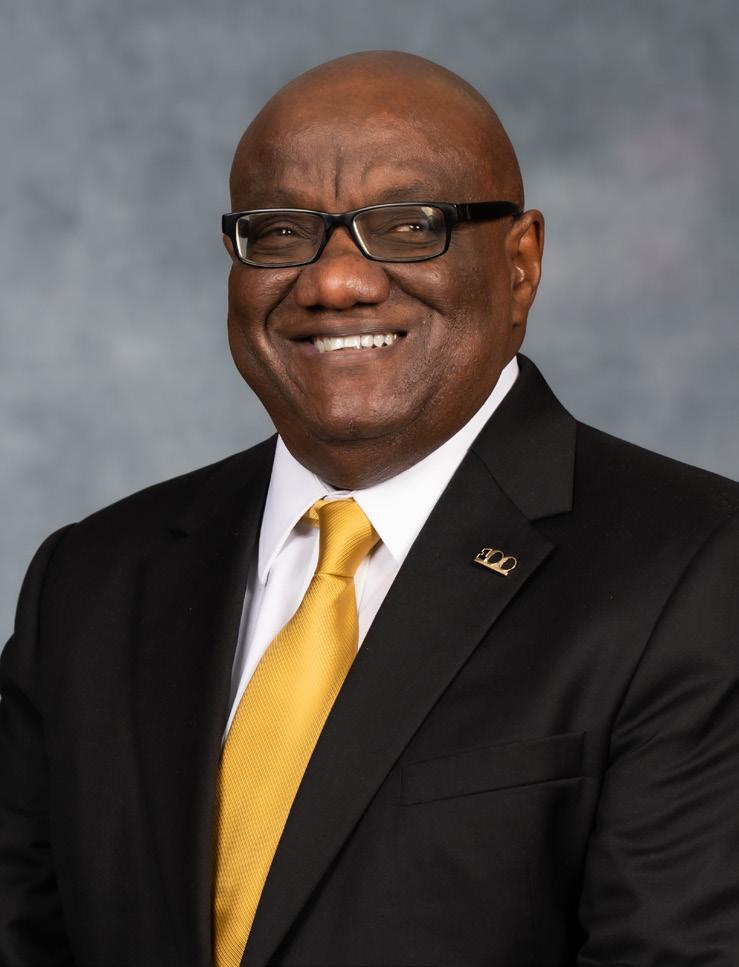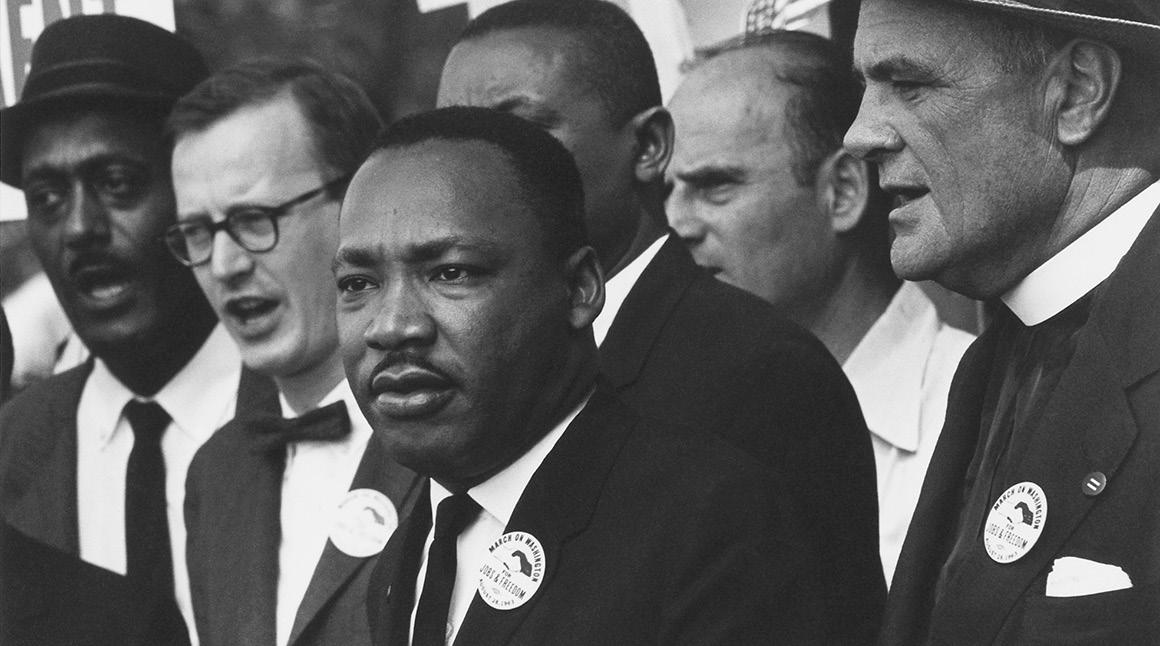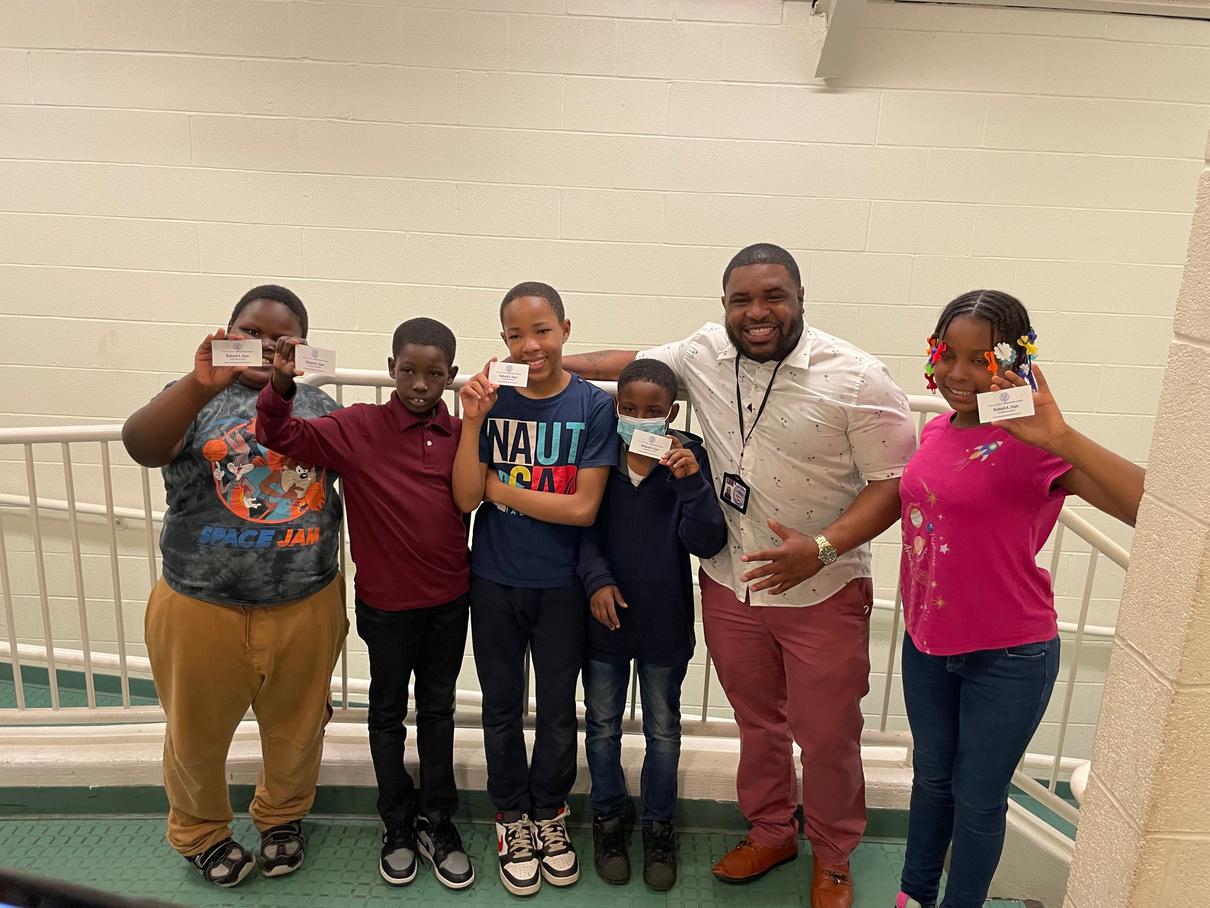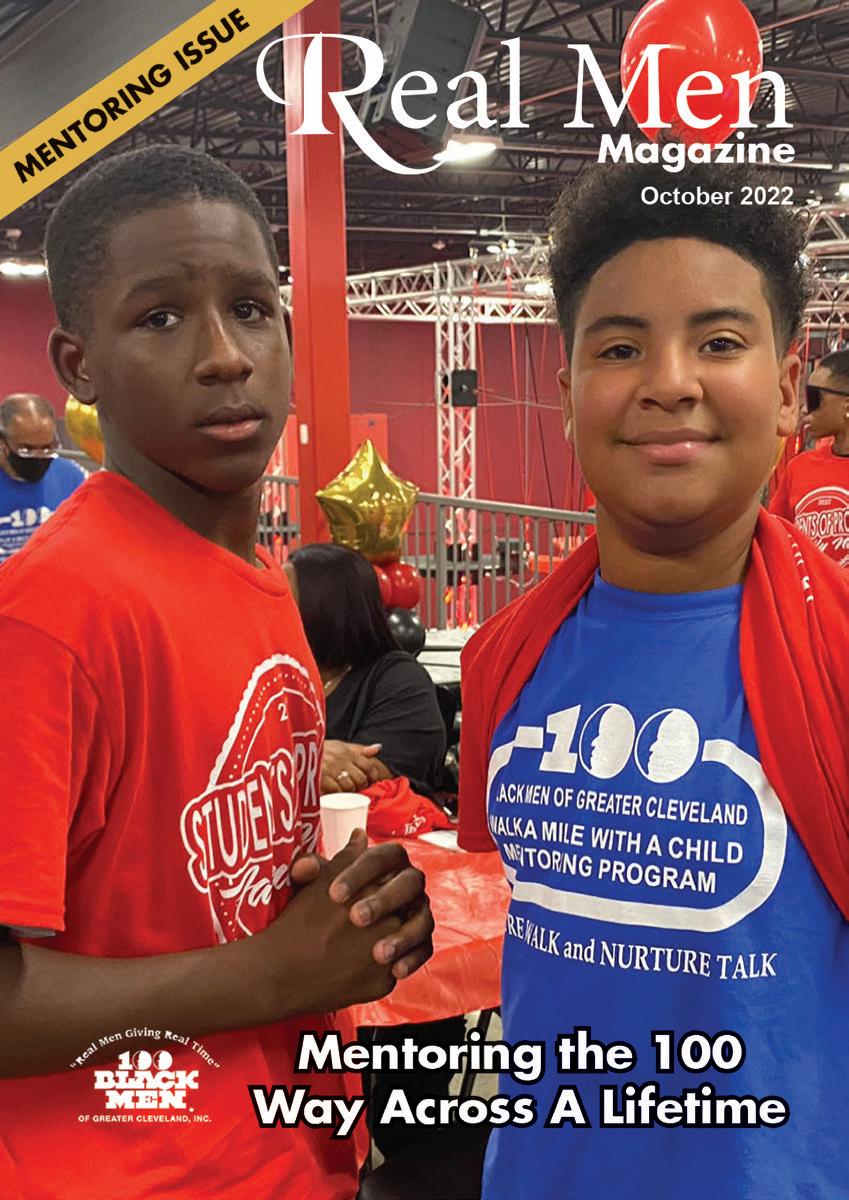BLACK HISTORY EDITION






Editors Page........................5
About Us..............................8
Chairman’s Message.........10
Leadership Team...............13
Education...........................18
Mentoring...........................20
Economic Empwerment....22

Health & Wellness..............24
Sickle Cell Disease............26
Hip Hop Culture................40
________________________
BLACK HISTORY SECTION
Black History Message......36
What Black History Means To Me...................................44
The Fierce Urgency of Now. 50
Barrett Strong......................55
Thank you, thank you, thank you. We are honored and humbled by the donations given to us by so many of you and the kind words of support you have shared about Real Men Magazine, our voice for The 100 Black Men of Greater Cleveland, Inc. Of course, I would like to personally thank the staff who help with this publication each month. With Chartered Members Franklin Martin and Rodney L. Brown, who brings an exemplary historical aspect to the table, we strive to continue growing and spreading the word about our Cleveland Chapter.
We also appreciate those who write letters to the editor, those who do not hesitate to voice their opinions and are willing to put their names behind those views. We value the ability to offer this forum to contribute to a betterinformed community that respects and exercises their rights to free speech and participation in government and society.
This issue, we look at Black History Month; this month means a lot to me, even though I feel every day is Black History because so many people are making History daily. The truth is, every month is Black History Month. Our celebration of the Black diaspora, in all the forms and identities that they come in, should not be relegated to a single month out of the calendar year. Black joy and Black success, and even everyday Black actions, deserve to be celebrated. After all, Black people do not need to be extraordinary to be recognized or deemed valuable members of society.
Many may not see it as I do, but just like Carl B. Stokes being the first Black Mayor of a major city, we now have Justin Bibb, a young Black man paving the way for other young Black young men to dream and believe that too can be a Mayor or even President.
Follow us online www.100blackmencle.org
 James W. Wade III Publisher & Editor
James W. Wade III Publisher & Editor

PUBLISHER & EDITORIAL DIRECTOR
James W. Wade III
MAGAZINE COMMITTEE
Robert Bankston
Brandon Curry
Delaun Dillard
Robert Dix Jr.
Christopher Howse
Franklin Martin
Retanio Rucker
LAYOUT & DESIGN
JW MEDIA ENTERTAINMENT



CONTRIBUTING PHOTOGRAPHERS
Rodney L. Brown
James W. Wade III
Earl Williams
CONTRIBUTERS
Rhonda Crowder
The Real Men Magazine is the official publication of The 100 Black Men of Greater Cleveland Inc. Chapter. Published monthly electronically, which means information is distributed utilizing a computer network or produced in a format for use with a computer.


For any questions or feedback about the publication, contact us at info@100blackmencle.org
www.100blackmencle.org


REAL MEN

The 100 Black Men of America, Inc. is recognized as the nation’s top African American led mentoring organization. Every African-American person should have the ability to create the life they’ve always wanted and that’s what The 100 Black Men of America, Inc. provides.
Committing ourselves to personify the type of people our children will look up to and emulate, we embrace the immense responsibility we have to our mentees and our communities. Providing these children another choice in life by being around likeminded individuals who have similar aspirations and goals.
As we have grown The Network of 100 Black Men of America, Inc. more companies and programs have been formed to assist in delivering the education and empowerment needed to change the course of these children’s lives. This is done through the 100’s Four For The Future focus areas; Mentoring, Education, Health & Wellness, and Economic Empowerment.
Through the expansion, we’ve created 100 Black Men Chapters that delivers unique programs that address specific needs in local communities. Through 57 years of testing, we’ve created the 100’s successful model. A proven blueprint for mentoring and developing young people into future leaders by surrounding themselves with a positive network and giving them the opportunity that they may not have thought was possible.
Our ongoing commitment to continuously improve and implement our programmatic initiatives is what drives us. Helping shape our mentees realize their potential by showing them how to be successful and significant, stressing the importance of obtaining and applying education, and providing them the tools that empower them for self-sufficiency, cultivated civic, and business leadership

ABOUT US 100 WAY ACROSS A LIFETIME
Letter from the Chairman
Since 1997 the 100 Black Men of Greater Cleveland, Inc. has been serving the Greater Cleveland area and mentoring our youth. Today, the 100 Black Men of America, Inc. is a national alliance of leading African American men of business, industry, and public affairs government, devoting their combined skills and resources to confronting the challenges facing African American youth. During this Black History Month, I salute the founders of this great organization in Cleveland. Little did Judge Michael Nelson and the other founders realize they were making history themselves. With a mission to improve the quality of life of our citizens and enhance educational opportunities for African- Americans, our members continue to serve as a vital force for overcoming cultural and financial obstacles and the achievements of African-American youth, emphasizing young African-American males.

Although the chapter has had a definitive history and a strong legacy, the members realize that we cannot simply rest on past accomplishments. There is much work to be done. Perhaps the late Rev. Martin Luther King, Sr. said it best when he stated, “All labor that uplifts humanity has dignity and importance and should be undertaken with painstaking excellence.” The 100 Black Men of Upstate South Carolina is committed to integrity and excellence. We have dedicated ourselves and our chapter to making a positive difference in our respective communities and in the lives of others. In that regard, our organization will maintain its commitment to the highest level of service and engagement with corporate, nonprofit, and community partners.
While this month, we are celebrating Black History Month, an annual observance originating in the United States, where it is also known as African-American History Month. It has received official recognition from governments in the United States and Canada and has recently been observed in Ireland and the United Kingdom.
I often think about how on December 1, 1955, Rosa Parks refused to relinquish her seat on a public bus. Parks’ protest sparked the Montgomery bus protests and galvanized the Civil Rights Movement. Yet she was not the first African American individual in Montgomery to stand up against injustice in such a manner. On March 2, 1955, fifteen-year-old Claudette Colvin was riding home on a city bus after a long day at school. A white passenger boarded, and the bus driver ordered Claudette to give up her seat. Claudette refused.
Sincerest regards,
Lee V. Fields, Jr. Chairman 100 Black Men of Greater Cleveland, Inc.

The overall concept of “The 100” began in 1963 in New York City when a group of concerned African American men began to meet to explore ways of improving conditions in their community. These visionaries included businessmen and industry leaders such as David Dinkins, Robert Mangum, Dr. William Hayling, Nathaniel Goldston III, Livingston Wingate, Andrew Hatcher, and Jackie Robinson. On October 2, 1986, representatives from 100 Black Men Chapters converged in Washington, DC, for a final meeting to establish a national organization. During previous meetings, they determined the structure, governance and model that would provide the most effective physical and financial resources to support the communities and Chapters. At the final gathering, the organization’s name – 100 Black Men of America, Inc. – was unveiled and attendees elected four accomplished, professional men from within their ranks to serve as its first and founding officers.

Each of the four were selected based on their demonstrated commitment to give back in a holistic way that addressed the educational, social, emotional, and cultural needs of youth in their own communities. They put their hands to the plow and did the hard work necessary to establish a foundation for a network of Chapters in their infancy, which today is an international nonprofit organization that positively impacts more than 125,000 youth across the United States and abroad. Throughout our history, the leadership of 100 Black Men of America, Inc. has been impeccable. The men chosen as national leaders all have contributed to the growth and strength of the organization. Their unique contributions have helped The 100 to become one of the premiere mentoring organizations anywhere. Consider the impact each leader has made. On May 27, 1987, in Atlanta, Georgia, this newly formed mentoring organization held its first national conference and introduced itself to the nation. Noted speakers included the late Alex P. Haley and the late Honorable Maynard H. Jackson.

On May 27, 1987, in Atlanta, Georgia, this newly formed mentoring organization known as 100 Black Men of America, Inc., held its first national conference and introduced itself to the nation. Noted speakers included the late Alex P. Haley and the late Honorable Maynard H. Jackson.




Carter G. Woodson Launched Negro History Week
On Feb. 7, 1926, Carter G. Woodson, initiated the first celebration of Negro History Week which led to Black History Month, to extend and deepen the study and scholarship on African American history, all year long. Further below is an essay on the history and purpose of the commemoration, including why Woodson chose February.
In 1915, Carter G. Woodson traveled to Chicago from his home in Washington, D.C., to participate in a national celebration of the 50th anniversary of emancipation. He had earned his bachelor’s and master’s degree at the University of Chicago and still had many friends there. As he joined the thousands of Black Americans overflowing from the Coliseum, which housed
exhibits highlighting African American achievements since the abolition of slavery, Woodson was inspired to do more to celebrate Black history and heritage. Before he left Chicago, he helped found the Association for the Study of Negro Life and History (ASNLH). A year later, Woodson singlehandedly launched the Journal of Negro History, in which he and other researchers brought attention to the achievements of Black Americans. Born in 1875 in New Canton, Virginia, Woodson had worked as a sharecropper, miner, and various other jobs during his childhood to help support his large family. Though he entered high school late, he made up for lost time, graduating in less than two years. After attending Berea College in Kentucky, Woodson worked in the Philippines as an education superintendent for the U.S. government. He earned his bachelor’s and master’s degrees at the University of Chicago before entering Harvard. In 1912, three years before founding the ASNLH, he became only the second African American (after W.E.B. DuBois) to earn a doctorate.
Like DuBois, Woodson believed that young African Americans in the early 20th century needed to be taught more about their
heritage and the achievements of their ancestors. To get his message out, Woodson first turned to his fraternity, Omega Psi Phi, which created Negro History and Literature Week in 1924. But Woodson wanted a more comprehensive celebration and decided the ASNLH should take on the task. In February 1926, Woodson sent a press release announcing the first Negro History Week. He chose February because the month contained the birthdays of Abraham Lincoln and Frederick Douglass, two prominent men whose historic achievements African Americans already celebrated. (Lincoln’s birthday was February 12; Douglass, formerly enslaved, hadn’t known his actual birthday but had marked the occasion on February 14.)
As schools and other organizations across the country quickly embraced Woodson’s initiative, he and his colleagues struggled to meet the demand for course materials and other resources. The ASNLH formed branches throughout the country, though its national headquarters remained centered in Woodson’s row house on Ninth Street in Washington, D.C. The house was also the home base
for the Associated Publishers Press, which Woodson had founded in 1921.
The author of more than 20 books, including A Century of Negro Migration (1918), The History of the Negro Church (1921), The Negro in Our History (1922), and his most celebrated text, The Mis-Education of the Negro (1933), Woodson also worked in education, as principal for the Armstrong Manual Training School in Washington, D.C., and dean at Howard University and the West Virginia Collegiate Institute.

Woodson never viewed the study of Black history as something that could be confined to a week. As early as the 1940s, efforts began to expand the week of public celebration of African American heritage and achievements into a more extended event. This shift had already started
in some locations by 1950 when Woodson died suddenly of a heart attack at home in Washington. With the rise of the civil rights and Black Power movements in the 1960s, young African Americans on college campuses were becoming increasingly conscious of the historical dimension of their experience. Younger members of the ASNLH (which later became the Association for the Study of African American History) urged the organization to change with the times, including the official shift to a month-long celebration of Black history. In 1976, on the 50th anniversary of the first Negro History Week, the Association officially shifted to Black History Month.
Since then, every U.S. president has issued a proclamation honoring the spirit of Black History Month.
Gerald Ford began the tradition in 1976, saying the celebration enabled people to “seize the opportunity to honor the too-often neglected accomplishments of Black Americans in every area of endeavor throughout our history.” Ronald Reagan’s first Black History Month proclamation stated that “understanding the history of Black Americans is a key to understanding the strength of our nation.”
In 2016, Barack Obama, the nation’s first Black president, made his last proclamation in honor of Woodson’s initiative, now recognized as one of the nation’s oldest-organized celebrations of history.



FOUR FOR THE EDUCATION




THE FUTURE

ECONOMIC DEVELOPMENT



100 Black Men of Greater Cleveland, Inc. Tutoring Every Week At Wade Park School
The 100 Black Men of America encompasses the 100’s Four For The Future Program. Focused on igniting mentors, mentees, and community leaders worldwide, our leadership empowerment programs develop leaders throughout the 100’s Global Network. Preparing and equipping youth by addressing critical issues and areas that specific communities face worldwide. Education is one of the pillars within the
Four For The Future. It is the most powerful weapon you can use to change the world. We aim to work with parents, families, community partners, and schools to teach African American youth the tools to make the world better. Beginning with early education, how the teacher nurtures your child’s talents will determine the path they will walk in life. Teachers are incubators that bring out the best in the child by stimulating their minds and inspiring them to do great things. Community
and higher education partnerships open doors for our youth to have a better chance to enhance their talents and opportunities.
The 100 Black Men of Greater Cleveland, Inc. has been tutoring young men at the Wade Park School for two years; each Wednesday morning, you will find the Education Chair, Grady Burrows, and members of the 100 mentoring and tutoring inner-city children each week.







A Day At The Cavaliers Game on Martin Luther King Jr. Day

The goal for the 100 Black Men of Greater Cleveland Inc. (100 BMOGC) mentoring program is for our mentors to share their knowledge, experience, and wisdom regarding the various aspects of life to support our mentees necessary to develop and further enhance the core skills (interpersonal and intrapersonal) required to become future leaders and productive community citizens.
Mentoring begins with the trust and ability to see everyone’s potential. Not every person starts at the same stage, but they all could create a positive impact on society, beginning with mentors’ guidance. Across the United States and Internationally, 100 Black Men
of America, Inc. is changing the lives of tomorrow’s leaders through the 100’s signature programs: Mentoring the 100 Way, Collegiate 100®, and 100 Black Men Chapters.
Each of our programs delivers unique mentoring initiatives that help tap into deserving youth annually and change their lives. Mentoring provides support and positively impacts the lives of tomorrow’s leaders today. We offer other activities to our mentees, such as going to various sports events. On MLK Day, we took a few mentees to a Cavaliers game to celebrate



ECONOMIC EMPOWERMENT

Economic Empowerment programs focus on 3-primary areas: Financial Literacy, Family Wealth Building, and Entrepreneurship. Through comprehensive seminars and training classes, these programs work to promote economic self-sufficiency. The 100 Black Men of America, Inc. considers economic empowerment necessary for creating just societies worldwide. 100 Black Men of America, Inc. encourages and fosters the ability of its mentees and members to be self-determined in creating dreams, pursuing them, and ultimately perpetuating those dreams and aspirations by establishing the mechanisms to sustain generational wealth. Through comprehensive curricula and training opportunities, our organization works diligently to promote economic self-sufficiency and break the cycle of generational debt. The goal of the 100 is to leave a legacy of wealth-building, which leads to debt-free living for the youth and communities we serve. Our economic empowerment programs and initiatives foster financial literacy, career development, financial planning, investment management, and fiscal responsibility at an early age. Exposing our youth and collegiate students to the skills, strategies, and mindset of entrepreneurship also provides beneficial, transferable knowledge that will help to establish a firm foundation from which they can later build
upon business development and wealth creation. The words of Dr. Martin Luther King, Jr. resonate as profoundly today as they did in 1967 when he declared, “The dignity of the individual will flourish when the decisions concerning his life are in his own hands; when he has the means to seek self-improvement.”
For far too many in the African-American community, lack of economic freedom has resulted in a vicious cycle of dependency. Through a series of programs targeting youth and adults, our goal is to provide education and access to resources that create a solid financial footing. So families will have the ability to provide for themselves and future generations.
“Give a man a fish and you feed him for a day. Teach a man to fish and you feed him for a lifetime.”
Cleveland doctor develops ethnic-based multivitamins
After becoming aware of the disparities, he committed his career to finding solutions.
Hall went on to educate himself on the topics and write about issues such as hypertension, stroke prevalence, and other high-risk health conditions plaguing African Americans on his personal website. To go “upstream,” he wrote a book for doctors and other healthcare providers to educate them on treating African Americans.
His book, “Patient-Centered Clinical Care for African Americans: A Concise, Evidence-Based Guide to Important Differences and Better Outcomes,” covers best practices for conditions such as high blood pressure and other common diseases disproportionately found in American Americans.
By Rhonda CrowderDr. Gregory Hall MD, a native of Cleveland who grew up in the Glenville community is a second-generation medical professional. He is an internal medicine physician who works at University Hospitals as the medical director for the Cutler Center for Men and has treated a predominantly African American clientele for more than 25 years.

For over a decade, Hall has served on the Cuyahoga County Board of Health and is currently the president. He’s also served on the Ohio Commission on Minority Health. While on these boards, he learned about the health disparities that exist among African Americans.
“I didn’t know what minority health was,” says Halls. “I didn’t know about the disparities, even though I lived it. This minority health thing does not impact minorities as people think. It impacts Black people.”
While writing his book, Hall devoted a chapter to laboratory result differences that varied by race or ethnicity. For example, he says, there are some instances where African Americans’ white blood cell (WBC) counts are dramatically lower. This normal variation runs in some families of African descent, but many doctors remained unaware of this condition and initiated additional and unnecessary testing.
“It’s called benign ethnic neutropenia. It’s not a disease. No increased risk for anything. It’s just a lab result,” says Hall. “If medical providers know about it, they can recognize it and move on.”
Finding a wide range of lab differences in his research, Hall started to review them more critically. He knew that vitamin D levels tended to be dramatically lower in African Americans. Hall later learned that zinc, magnesium, potassium, and vitamin C tended to be significantly lower as well so he thought making a supplement that uniquely addresses these deficiencies in a population with poor health outcomes might finally make a positive difference in African American health.
Then what he discovered about vitamin E startled him the most.
“Some research found that vitamin E was associated with an increased risk of prostate cancer,” says Hall. “I was like, wow, Black men have by far the highest prostate cancer rate.” Hall explains that one pill of vitamin E with 400 international units (IU) a day is associated with worse outcomes than if you didn’t take one of those a day. Selenium was also found to be associated with increased cancer risk in some studies. Other research has subsequently been conflicting in their risk conclusions, but none shows an advantage to taking vitamin E or selenium.
Until the controversy regarding vitamin E and selenium’s risk is settled, Hall determined he would create a multivitamin and deliberately leave these out, something no other major multivitamin company to date has done, he says.
Following medicine’s central tenet to “first do no harm,” Hall turned to vitamin K which is essential for blood to clot.
“African Americans have no evidence of vitamin K deficiency,” says Hall. “However, we do have the highest rates of stroke (blood clot in the
brain), heart attack (blood clot in the heart), and deep vein thrombosis (clots in the legs).” He adds, “While there is no direct evidence that increased vitamin K causes these deadly clots in African Americans, why risk taking more particularly if there is no deficiency?”
With all considered, Hall developed GNetX Sequence Multivitamin tailored to the published research specific to African American health with the goal of maximizing the benefit and minimizing any risk.

“I removed the things that could potentially cause problems. More is not always better. There’s a preferred ingredient mix and amount in every good recipe. Why should multivitamins be different?” says Hall.
GNetX Sequence Multivitamins hit the shelves in Dec. 2020 with four formulas: African American men, women, men over 50, and women over 50, and can be purchased online at SequenceMultivitamins.com, as well as on Amazon.com and Walmart.com.
“Half of the people who try them continue to buy them and a lot of people are very proud that I took the time to put this formula together,” he says.Richard Andrews, 77, is the publisher/ editor of The Real Deal Press and has been Hall’s patient for about 8 years. He’s a consumer of the GNetX Sequence multivitamin formulated for Black men over 50. He says there’s no immediate benefits he can detect, as with all multivitamins but as one who writes and edits health-related stories, when he comes across ingredients important for someone of his age and stage, he’ll look to see if it’s included in GNetX Sequence. And, it is.
“I find it reassuring that there’s a product designed for me,” says Andrews, who also notes it’s the only medication he takes.
Hall says he will continue to develop multivitamins tailored for other racial/ethnic groups but wanted to start with African Americans since they have the worst outcomes. “This is really going to be a gamechanger in terms of supplements,” says Hall.
WHAT IS SICKLE CELL DISEASE?
People who have sickle cell trait (SCT) inherit a hemoglobin “S” gene from one parent and a normal gene (one that codes for hemoglobin “A”) from the other parent. People with SCT usually do not have any of the signs of the disease. However, in rare cases, a person with SCT may develop health problems; this occurs most often when there are other stresses on the body, such as when a person becomes dehydrated or exercises strenuously. Additionally, people who have SCT can pass the abnormal hemoglobin “S” gene on to their children.
S is an abnormal form of hemoglobin that causes the red cells to become rigid and sickle-shaped. This is called sickle cell anemia and is usually the most severe form of the disease.
In a meeting with a Red Cross representative, she explained the importance of African Americans donating blood, and it was stated. Caucasian would not have the same blood type to help with sickle cell.
acute chest syndrome, and stroke.
By James W. Wade III EditorWe face various health issues, including diabetes, high blood pressure, cancer, and Sickle Cell. People with this form of SCD inherit two genes, one from each parent, that code for hemoglobin “S.” Hemoglobin
Sickle cell disease (SCD) is a group of inherited red blood cell disorders. Red blood cells contain hemoglobin, a protein that carries oxygen. Healthy red blood cells are round and move through small blood vessels to carry oxygen to all body parts. In someone with SCD, the hemoglobin is abnormal, which causes the red blood cells to become stiff and sticky and look like a C-shaped farm tool called a “sickle.” The sickle cells die early, which causes a constant shortage of red blood cells. Also, when they travel through small blood vessels, they get stuck and clog the blood flow. This can cause pain and other serious complications (health problems) such as infection,
SCD is diagnosed with a simple blood test. In children born in the United States, it is most often found at birth during routine newborn screening tests at the hospital. In addition, SCD can be diagnosed while the baby is in the womb. Diagnostic tests before the baby is born, such as chorionic villus sampling and amniocentesis, can check for chromosomal or genetic abnormalities in the baby. Chorionic villus sampling tests a tiny piece of the placenta called the chorionic villus. Amniocentesis tests a small sample of amniotic fluid surrounding the baby. Because children with SCD are at an increased risk of infection and other health problems, early diagnosis and treatment are essential.
Sickle cell anemia is rare in the United States, affecting about 100,000 people. It primarily affects people whose ancestry links back to parts of the world where many people have malaria and carry a gene that partially protects against anemia. This gene also causes sickle cell anemia. In the United States, sickle cell
anemia affects many people who are Black. It may also affect people from southern European, Middle Eastern, or Asian Indian ancestry.
Anyone with sickle cell anemia, including babies, is at risk for stroke. Approximately 11% of people with sickle cell anemia have strokes by age 20, and 24% have strokes by age 45. Here is information on stroke symptoms:

•Severe headache.
•Sudden weakness on one side of your or your child’s body.
•Change in alertness.
•Trouble speaking.
•Trouble seeing.
•Trouble walking.
Splenetic sequestration
This happens when sickled cells become stuck in your spleen, forcing your spleen to get larger. Splenic sequestration often causes acute anemia. Symptoms include:
•Pain in your upper left belly (abdomen).
Children’s enlarged spleens are sometimes visible or can be felt through their skin.
Bacterial infections
People with sickle cell anemia have an increased risk for infections caused by Streptococcus pneumoniae, Haemophilus influenzae, and non-Typhi Salmonella species. Symptoms include:
•Fever.
•Coughing.
•Trouble breathing.
•Pain in bones.
•Headaches.
The Red Cross needs your help battling this disease; they ask you to consider donating blood to help Sickle Cell patients. Who better to help than African Americans? Visit their website for more information at RedCrossBlood.org.

Common concerns for ethnically diverse donors


Unique Donors
Blood donors from all racial and ethnic backgrounds are needed, because patients from all backgrounds need the lifegiving gift of blood.
As an ethnic blood donor, you may have the unique ability to help patients with special needs. Many ethnic minority groups have rare blood types, such as types U negative and Duffy negative, which are distinctive to their community and serve specialized purposes.
As a result, an ethnic minority patient with sickle cell disease is more likely to find a match among those of the same ethnic background.
The Red Cross also works to find rare blood donors to meet the specialized needs of patients all over the country. Through its 39 Immunohematology Reference Laboratories, offering support to hospitals across the country, and its collaboration with AABB on the American Rare Donor Program, the Red Cross helps insure that patients will get the blood they need at any time of the day or night.
It is vital that our blood supply reflect the diversity of our population to best meet the needs of all. Whether AfricanAmerican, Asian-American, Native-American, Latino, or one of the many other ethnic populations that make up the rich mosaic of our country, your donation matters.
Unique Needs
People of various ethnic backgrounds can suffer from a common debilitating condition related to blood disorders. These disorders can require regular blood transfusions to alleviate pain and continue to allow the individuals to live.
The best chance for a successful transfusion comes from blood donors of similar ethnic backgrounds, because each ethnicity has specific phenotypes in their blood. The best match for one patient is not necessarily the best match for another patient. Your donation may match a patient with specific needs.
I am afraid of needles. At your Red Cross blood drive, only trained staff members will draw your blood. You will feel a brief pinch, but the donation itself is not painful.
Is it safe to give blood?
Your safety is our priority. A fresh, disposable tubing and collections set are used with each donor. Each needle is used only once and then discarded.
Is blood typed, labeled and distributed by race? Blood is typed, labeled and distributed to hospitals with no indication of gender or race of the donor.
If there is a blood shortage, will I be able to get blood if I end up in the hospital? The American Red Cross makes every effort to ensure that area hospitals have blood available when patients need it. We cannot meet the need without your generous gift of blood donation.
Is my privacy protected? Yes, all information is held in absolute confidence in the Red Cross data bank. The Red Cross must maintain your confidentiality, and will not share information without your specific written consent.

What happens to my blood after it is collected?
Your donation is stored at the Red Cross Facility. Blood samples are checked for viruses and other communicable diseases including HIV and Hepatitis C. Those units that pass the testing criteria are released to hospitals usually within 48 hours for patients’ use. If an abnormality is detected, a donor counselor will contact you to discuss the findings. This is done in strict confidence.
Am I eligible to donate if I have a health condition such as diabetes, anemia, high blood pressure, heart disease, etc.? Those with chronic illnesses such as diabetes or high blood pressure may still be able to give if the condition is kept under control through medication.
Why should a diverse donor pool matter to you?
The best blood match for patients often comes from donors of similar race or ethnicity. It is extremely important to increase the number of blood donors from all racial and ethnic groups. Red Cross and Sickle Cell Disease Association of America, Inc. supporters, such as you, can help connect our organizations with donors that best meet the needs of patients of all backgrounds.
There Are Many Blood Types
• While the most common blood groups are based on the presence or absence of two antigens in the blood, called ‘A’ and ‘B’, there are in fact more than 600 known antigens that create a wide spectrum of rare blood types.
• Blood types are hereditary. Certain blood types are unique to specific racial and ethnic groups. For example, U-negative and Jsb negative blood types are found more often in people of African descent. So sickle cell patients that require these blood types must rely on donors with matching blood types from people of African descent.

• An African-American blood donation may be the best hope for the needs of patients with sickle cell disease, as over 90% of sickle cell patients are of African descent and will require multiple transfusions over their lifetime. Blood from people of the same race and ethnicity can mean fewer health complications after a blood transfusion.
How You Can Help
• Recruit organizations that have diverse employees/members to host blood drives and support blood donation.
• Set up a virtual blood drive on RedCrossBlood.org/SleevesUp and encourage others to donate.
• Utilize MatchUp, a challenge platform on SleevesUp (at RedCrossBlood.org/SleevesUp), to initiate a friendly blood competition.
• Educate and engage your network about the importance of diverse donor pools.
SICKLE CELL ANEMIA BLOOD RECIPIENT | Aaron’s Story
Aaron was diagnosed with sickle cell anemia when he was 2 years old and endures the pain associated with this debilitating disease on a daily basis. A key component in his pain management is receiving multiple units of blood every three weeks. He is able to live a relatively normal life through the generosity of strangers who voluntarily donate blood.
Learn more at: RedCrossBlood.org/SickleCell



The Akron Cleveland Association of REALTORS® Installs President, Officers, and Board of Directors
100 Black Men of Greater Cleveland, Inc. member will lead The Akron Cleveland Association of REALTORS®

The 100 Black Men of Greater Cleveland Inc. is always happy when our members make a difference and do great things in the community. Member Akil Hameed is one of those men who has become the new 2023 Akron Cleveland Association of Realtors President. “I am thrilled to be in this role and serve our 7000 members between Cuyahoga, Summit, and Portage Counties. My 2023 Theme is “Experience the Community” E4| Engagement| Education| Equity| Empowerment,” said Hameed.
At its annual inaugural event on Thursday, January 11, 2023, The Akron Cleveland Association of REALTORS® (ACAR) installed its new 2023 President, Officers, and Board of Directors. Newly elected members will serve on the Board of Directors for terms beginning in 2023.
The Board of Directors comprises a minimum of sixteen directors elected by the membership and is the governing body of the Akron Cleveland Association of REALTORS®. The board shall consist of 15 REALTOR Members, one affiliate member, and one Commercial/Industrial REALTOR. Directors serve for three years.
The following ACAR members were installed as officers:
Akil Hameed, President
FASS Management & Real Estate Services
Mark Vittardi, President-Elect
Century 21 DePiero & Associates, Inc.
Drew Gaebelein, Treasurer eXp Realty
Candice Eberhardt, Immediate Past President Eberhardt Realty& Management
“I am honored to serve with this outstanding group of members joining our Board of Directors in 2023,” said Akil Hameed, newly installed President of ACAR. “This is a great opportunity for our members to Experience the Community and connect with the 2023 goals around Engagement, Education, Equity, and Empowerment which are our pillars for this year. We have an exciting year ahead”.
Board of Directors members who were sworn in that night include Tim Damiano of Russell Realty Co., Beth Dzurilla of Mutual Title Agency, Inc., Jeremy Fennell of eXp Realty, Ed Hazners of Real Brokerage Technologies, Cindy Kelly of RE/MAX Crossroads Properties, Michael Mendoza of FASS Management
& Real Estate Services, Melissa Mentzer of Howard Hanna, Kady Overton of Keller Williams Living, Gary Post of RE/MAX Crossroads Properties, Jeff Russell of Russell Realty Co., Erich Wachtel of Howard Hanna, Andrea Wilson of BHR & Associates, and Jeannet Wright of FASS Management & Real Estate Services.

ACAR’s mission is to empower its nearly 7,000 members to be professional, ethical, and successful by providing exceptional services and protecting fundamental property rights for all. For more than 100 years, the association has been the voice of real estate, dedicated to the excellence and advancement of real estate professionals in Northeast Ohio.

(PICTURED TO THE RIGHT)
Hameed’s Family
Akil Hameed
Felicia Hameed-Wife
Savannah Hameed (17)
Serene Hameed (16)
Seth Hameed (12)
Sasha Hameed (11)



WHAT BLACK HISTORY MEANS TO ME…
By: Pastor Robert M. Dix Jr..Every year the month of February is set aside as a month-long acknowledgment/ celebration of the impact and accomplishments of African-Americans in the History of our nation. Originally established as Negro History Week in 1928 by Carter G. Woodson with the organization The Association for the Study of Negro Life and History, the aim was to encourage people of all ethnic and social backgrounds to discuss the “Black Experience.”
The older I grow, the more I’ve come to appreciate the rich heritage of “Black History.”
As a father and even more as the Senior Pastor of an African-American congregation, I am compelled to share it with this generation to convey that we have come a mighty long way as a people. As I recount the conversations I

had with my grandparents and parents, and many of the men and women I’m blessed to know who lived through the 1940s, 50s, and 60s, through the periods of the great migration (moving from the south), and the Civil Rights Movement, I become the conscience of the fact that they struggled, that we might enjoy a better life than they did. When I hear of the stories of young men dropping out of school, with only the options of military, factory work, or hustling; our young women many finished high school but landed jobs in daily work, secretarial, or the telephone company aka Ma Bell, my heart aches when I see and hear of young people today refuse to take advantage of the many opportunities.
And so, my response to “What Black History Means to ME” is it is an opportunity to encourage this generation of young black leaders that THEY CAN BECOME WHATEVER AND WHOMEVER THEY WANT TO! When we look back over the History of our people, we can answer the age-old question of whether African-Americans can make a difference?... with the words of our first Black President, Barack Obama “YES WE CAN!” The only thing we need to do is to push for the whole History of this nation to be taught; and passed on… and it starts with us. The “whole” historical record of the United States reveals that from its birth, every hero or person of great significance to White-Americans, right next to them is a strong African-American who made just as big or more significant an impact. From the Revolutionary War to the Ukraine Conflict, you’ll find us:
“You can’t teach about Abraham Lincoln without teaching about Frederick Douglass”
•You can’t teach about George Washington without teaching about Crispus Attucks.
•You can’t teach about Abraham Lincoln without teaching about Frederick Douglass
• You can’t teach about Albert Einstein without teaching about George Washington Carver
• You can’t teach about John F. Kennedy without teaching about Martin Luther King Jr.
• You can’t teach about Robert Kennedy without teaching about Malcolm X
•You can’t teach about Eleanor Roosevelt without teaching about Rosa Parks
•You can’t teach about Elvis Presley without teaching about Michael Jackson
• You can’t teach about Steven Spielberg without teaching about Tyler Perry
• You can’t teach about Martha Stewart without teaching about Oprah Winfrey
•You can’t teach about Bill Clinton without teaching about Barack Obama
• You can’t teach about Hilary Clinton without teaching about Condoleeza Rice

• You can’t teach about Nancy Pelosi without teaching about Kamala Harris
Black History is me… Black History is you…





“Hip-Hop Culture Blocks to Boardrooms”
Gang’s, 1979 song “Rapper’s Delight,” died September 29, 2011. Several people were influential in creating hip-hop; the most notable pioneers are DJ Kool Herc, Afrika Bambaataa, and Grandmaster Flash. This opened the door globally, now internationally, that is continually evolving. Black people’s brilliance, resilience, and creativity have existed since our origin. Anything we lay our hands on adds flavor and excellence evident throughout history. HipHop is no different, influenced by skat, jazz, and Last Poets, and during slavery, our hands, feet, and mouth helped us escape reality through good and bad times. Other cultures try to duplicate and replicate but humiliate themselves to emulate Hip-Hop, but it’s organic to the roots.
 By Robert L. Bankston
By Robert L. Bankston

For years when we talk about Black History, we talk about the same people. Even though I agree they were history makers, I wanted to look at Black History through my eyes. Fifty years ago, in 1980, the world heard for the first time, “I said a hip, hop, the hippie, the hippie to the hip hop-a you don’t stop the rock It to the bang-bang boogie, say up jump the boogie to the rhythm of the boogie, the beat.” In 1979 Sugar Hill Gang hit the airways with “Rapper Delight,” the first commercial record and still a pillar of hip hop in every black community and beyond. Selling over 14 million copies of “Rappers Delight” would lay the foundation for a genre 50 years later, Mike Wonder worth 80 million & Big Bank Hank before passing worth 61 million members or Sugar Hill Gang. According to the New York Times -The Real First lady of hip-hop Sylvia Robinson, 75, a singer who performed rhythm-and-blues hits in the 1950s and later found resounding success as a producer who nurtured the birth of a new musical genre, hip-hop with Sugar hill
The rhythm is in our DNA, extending to the heartbeat of our dance, displayed creativity of our graffiti, the methodical technique of scratching & mixing, the glide in our stride, tearing down barriers we did not know existed. Hip-hop is a subculture and an art movement that emerged from the Bronx in New York City during the early 1970s. Stop! Let’s be clear Cleveland, Ohio is full of Black entertainers, and hip-hop is no expectations. In Da Land, from old-school to a new school, Mc Chill, Mc Brains, Brothers 4 The Struggle, Bone Thugs
-n- Harmony, Ray Cash, Ray Jr, Q Money, Kid Cudi and the list goes on. Cleveland legend the late Silva B was instrumental in connecting the dots to all. Hip-Hop lyrics, not all, but some reflect the adverse effects of post-industrial decline, political discourse, and a rapidly changing economy. Black people have always made a way out of no way. Hip-Hop is an unstoppable movement that has produced several Black Millionaires and Billionaires who used their hip-hop platform to catapult them from the block to the boardroom, creating generational wealth.
Rap is something you do; hip hop is something you live.” KRS One Reflecting on Hip-Hop, the critics said, “it would not last because it was a fad.” The Hip-Hop culture and presence are everywhere. Almost every commercial has a hip-hop undertone, and television shows and movies like Breaking, Crush Grove, Brown Sugar, and Hustle & Flow received an Oscar, to name a few. In 1989 The Fresh Prince & Jazzy
Jeff won the first Grammy, and the first rapper to go diamond by selling ten million records was Mc Hammer. The first known tragedy was August 27, 1987, in Scott La Rock from Boogie Down Productions. The Tupac & The Notorious Big situation was tragic; sadly, rappers are falling too fast too often.
Hip-Hop history is another example of how we took nothing and made something. According to Forbes, the Hip-Hop community generates over several billion dollars annually. Martin Luther King Jr. and Malcolm X did not experience Hip-Hop, but their lives opened the doors to an opportunity called Hip-Hop that will last forever. “And he’s allowed me to go to the mountain. And I “ve looked over, and I’ve seen the promised land! I may not get there with you, but I want you to know tonight that we, as a people, will get to the promised land.”



WHAT BLACK HISTORY MEANS TO ME…
For me, Black History Month serves as the time when we reflect on the contributions of African Americans to our country. We honor and celebrate the past legacy leaders have laid for present and future generations to follow. And in today’s climate, it means supporting the African American community amidst the racial injustices and disparities that continue to occur. It’s important to remember that Black History is American History, and our struggles, progress, and aspirations are essential to the story of America. They should be taught and celebrated in February and throughout the year.
Gregory Lockhart Vice - Chairman


The month of February is a constant reminder that representation matters. It is also a motivation to excel beyond our current cultural, societal, political, socioeconomic, and identity constraints, just as those who came before us did. We honor their passion for pursuing and their constant press during Black History Month. While we often hear “this is the shortest month” comments, this short month is also the acknowledgment of the undeniable proof of the contributions our people have made to the whole history of not only those who identify as BLACK but all over the world. Being BLACK means being proud that you are part of a resilient, firm history and even more influential culture.
Aqeel Seals Membership ChairFebruary is celebrated annually as Black History Month. For me, this is a crucial time to reflect on and honor the contributions of African Americans to the United States. This month is a time for everyone to come together and celebrate the achievements of black Americans. For me, Black History Month is a time to reflect on the past year, relish in the blessings of the present, and look ahead with optimism and resolve for the years to come. I appreciate the hard work and sacrifices of those who came before me because of the opportunities they provided me. However much time I spend contemplating those who came before me, I am well aware that there are still heroes and sheroes of the black community at work and home in this country. I’ve been trying to put together my contribution to the book on AfricanAmerican history. I will always remember that, like every person of African descent, I am capable of great things. In honor of Black History Month, may we all be reminded that we are capable of great things. Not only in February but all year long
Christopher Howse
&PEOPLE EVENTS
Congratulations to Grady Burrows, who was selected as a 2023 Changemaker Award Recipient by HIMSS (Health Information Management Systems Society). As (HIT in the CLE) moves forward every day to make a positive difference in the lives of Black and Brown Students within the fields of computer and data science, it is indeed encouraging to have the support of a global organization such as HIMSS.


Retanio Rucker Moving Onward and Upwards
On January 16, 2023, Bro. Retanio Aj Rucker began as a Litigation Associate with Margaret W. Wong & Associates LLC. He will be handling child custody, criminal, and immigration cases in Ohio and around the Country. Congratulations to our brother!
management, tax, and finance. He is one of the founders and managing partners of CLE Consulting Firm, an accounting, tax, and payroll company located in downtown Cleveland. As a firm, innovative financial and strategic leader with instincts and intellect, Purnell is a formidable combination in the business world. He has served in executive positions, leading business and finance departments within multimillion dollar for-profit and nonprofit corporations.
Congratulations to LaRese Purnell, now the Chairman of the Board of Directors for the Step Foward organization. Purnell was quoted as saying, “Who would have ever thought that I would one day become the for this organization, Step Forward (formerly known as CEOGC), one of Ohio’s largest community action agencies, that I once stood in line growing up with my family, to receive assistance with our utilities (electric, rent, and heat) through programs like HEAP, PIPP, and Headstart that has assisted 1000’s of families right here in our community over the years. Even as a young father, Headstart was a blessing to my kids and my family,” said Purnell.

What was even more special and a coincidence and blessing was that it was announced at the Grand Opening of one of the new Step Forward community centers in Warrensville Hts, where he grew up. Life tends to come full circle. “God is so amazing, and I can’t wait to continue serving our community alongside my fellow Board members, our dynamic CEO Dr. J. Chisolm, and our entire Leadership and staff team,” said Purnell.
Last year Purnell was appointed the Co-Chair of the Economic Empowerment Program for the National 100 Black Men of America. Purnell has 18 years of experience in business
Scan the QRC Code to visit our website
Purnell is the author of Financial Foundations: Building Financial Freedom One Tool at a Time, where he uses everyday language to address people’s fundamental questions about money. Purnell also created The Real Black Friday, which brings awareness and develops educational and collaborative opportunities for hundreds of small Black-owned businesses. Purnell has traveled to over 35 cities nationally to teach financial literacy at conventions, seminars, colleges, universities, and other events. He has been featured in local and national publications and has appeared on multiple radio and television programs discussing financial matters. Purnell has received several awards, including the Smart 50 Business award, Crain’s Business 40 under 40, Cleveland Magazine’s Most Interesting People, and more.

The 100 Black Men of America, Inc. is recognized as the nation’s top African American led mentoring organization.


37th Annual Conference, June 14th - 18th, Las Vegas, NV

He’s worth the investment...


The Fierce Urgency of Now
By Retanio Aj RuckerThe Reverend Dr. Martin Luther King, Jr. (after this referred to as “Dr. King”) was born a “Negro” in Atlanta, Georgia, on January 15, 1929. Despite this “accident of birth,” some scholars have theorized that Dr. King’s emergence as a civil rights leader, both locally and nationally, was inevitable given the time he was born. Privately, Dr. King was impressed by the pattern of coincidences and accidental good timing typical to the lives of famous men. On the other hand, he wondered what he believed to be the Lord’s work. As such, the man that Dr. King would ultimately become was not necessarily, from his perspective, inevitable.
The first step on his path to becoming a local and national civil rights leader was to choose a career. Dr. King’s decision required years of careful and deliberate thought. Should he become an attorney, a doctor, or a minister? At one point in his life, Dr. King dismissed the ministry as a vocation because he thought

it was too unintellectual and too archaic to speak effectively on contemporary issues. This decision was further complicated by the fact that until he was fifteen (15) years of age, Dr. King had up to three (3) months of schooling in any given year. Despite this disadvantage, Dr. King could attend and graduate from Morehouse College (after this, referred to as “Morehouse”) in Atlanta, Georgia. After his Morehouse experience, Dr. King decided to pursue a Bachelor of Divinity Degree. Thereby preparing him to be the leader he would eventually become.
We celebrated Dr. King’s life and legacy on Monday, January 16, 2023. His struggle in deciding upon which career path to pursue was pivotal. Would we have heard about The Dream if Dr. King had decided to become an attorney or a doctor rather than a minister? If Dr. King had become an attorney or a doctor, would we have received The Letter From A Birmingham Jail? Would there have been a March on Washington? Would The Edmund Pettus Bridge have become the symbol of freedom we understand it to be today? Would
we have met Mrs. Coretta Scott King or Congressman John Lewis, among others?
The struggle for democracy and economic, political, and societal freedom for all people, i.e., the American Dream, is ongoing. This dream has yet to be realized by People of Color, other minorities, the LGBTQIA+ Community, and women as a collective. The right to vote has still not been secured for all Americans despite the bloody sacrifices of our Ancestors. And unfortunately, slavery has not been eradicated despite the “promise” of the Thirteenth Amendment. This struggle is interwoven into Dr. King’s life and legacy. In other words, how can we make the American Dream achievable no matter a person’s age, ethnicity, gender, race, religion, sex, or sexual orientation? Just as this struggle is part and parcel of Dr. King’s life and legacy, so is the blueprint for achieving this goal. Specifically, Dr. King said: We are faced with the fact that tomorrow is today. We are confronted with the fierce urgency of now. In this unfolding conundrum of life and history, there is such a thing as being too late. This is no time for
apathy or complacency. This is a time for vigorous and positive action.
Consequently, to realize Dr. King’s Dream, we must be ever-vigilant. We must continue the fight against oppression. We must stand in the breech and repel the forces of darkness. We must leave a legacy for those who come after us to follow. As we celebrate the life and legacy of Dr. King, we must be mindful that each of us is destined from birth for a specific purpose. Find it! Accept it! Let your particular purpose parallel. Dr. King’s life and legacy. Be mindful that our choices are pivotal because the ultimate measure of a man or woman is not where he or she stands in moments of comfort and convenience but where he or she stands at times of challenge and controversy.
Don’t be fooled! We live in challenging and controversial times. The fierce urgency of our now is upon us. This is our time! How will you be remembered?

HISTORY MAKER BARRETT STRONG PASSES
Strong didn’t use it as a springboard for a long recording career of his own. Instead, he teamed with music wunderkind Norman Whitfield to create one of the most successful songwriting teams in popular music. The two penned the guts of Motown’s biggest hits in the late 60s and early 70s by such artists as The Temptations (“Papa Was A Rolling Stone,” “Just My Imagination,” “Cloud Nine” and many more), Marvin Gaye (“I Heard It Through The Grapevine”), and Edwin Starr (“War”). Strong and Whitfield’s ability to move the label’s sweet, orchestral soul into a hot, grittier blend that incorporated rock and the funk sounds pioneered by Sly & The Family Stone and James Brown gave Motown its second life as America’s #1 record label.
Barrett Strong (born February 5, 1941) is an American singer and songwriter. Strong was the first artist to record a hit for Motown, although he is best known for his songwriting work, particularly in association with producer Norman Whitfield. “I Heard It Through the Grapevine” was initially written by Norman Whitfield and Barrett Strong for Motown Records in 1966 and made famous by Marvin Gaye in a single released in October 1968.
The Mississippi-born Strong was one of the first artists to sign to the fledgling Motown label in 1960. Later that same year, the 19-yearold delivered the first significant hit for Berry Gordy’s company, shooting to #2 on the charts with “Money (That’s What I Want),” a chugging number that announced the arrival of the Detroit label to the world.
“Money” went on to be recorded countless times over the years by various artists, but
In the early 70s, Motown relocated to the West Coast, and Whitfield left the fold to form his label. This became the opportunity for Strong to resurrect his solo career. He released albums on both Capitol Records and Epic Records, achieving some success with the single “Is It True” and the 1975 album Stronghold. While his production slowed down beginning in the 80s and beyond, Strong continued to write for other artists and returned in 2008 to record a sequel to his Stronghold album, Stronghold II. He was not a household name, but it is difficult to overstate the role that Barrett Strong played in establishing the most fantastic Black record label ever and then moving popular R&B music to the funk-driven soul that would define it from the late 60s into the mid-70s.
Barrett Strong ended his working relationship with Motown in 1971, but his contributions to the company’s success would earn him induction into the Songwriters Hall of Fame in 2004.
Strong just recently passed; he will be greatly missed, even as we celebrate his tremendous contribution. This man made it into the Black History books.



FRIENDLY INN SETTLEMENT, INC.




P r o g r a m s P r o g r a m s g s

S t e p F o r w a r d 5 - S t a r H e a d S t a r t P r o g r a m
S t e p F o r w a r d 5 - S t a r H e a d S t a r t P r o r a m S t e p F o r w a r d 5 - S a r H e a d S t a r t P r o g r a m
F o o d P a n t r y F o o d P a n t r y F o o d P a n t r y
Y o u t h P r o g r a m s u t h P r o g r a
Y o u t h P r o r a m s
M o m s F i r s t M o m s F i r s M o m s F i r s t
P a r e n t s a s T e a c h e r s P a r e n t s a s T e a c h e r s P r e n t s a s e a c h e r s

H e l p M e G r o w
H e l M e G r o w H e l p M e r o w
M o m s Q u i t f o r T w o o m Q u i t f o r T w
M o m s Q u i t f o r T w o
G e r a l d i n e B u r n s B e h a v i o r a l H e a l t h S e r v i c e s e r a l d i n e B u r n s B e h a v i o r a l H e a l t h S e r v i c e s
G e r a l d i n e B u r n s B e h a v i o r a l H e a l t h S e r v i c e s
C o m m u n i t y B a s e d S e r v i c e s
C o m m u n t y B a s e d S e r v i c e s
C o m m u n i t y B a s e d r v i e s
R o s i e ' s G i r l s R o s i e ' s G i r l s s i ' i r l s
M Y C O M M Y C O M M Y M












